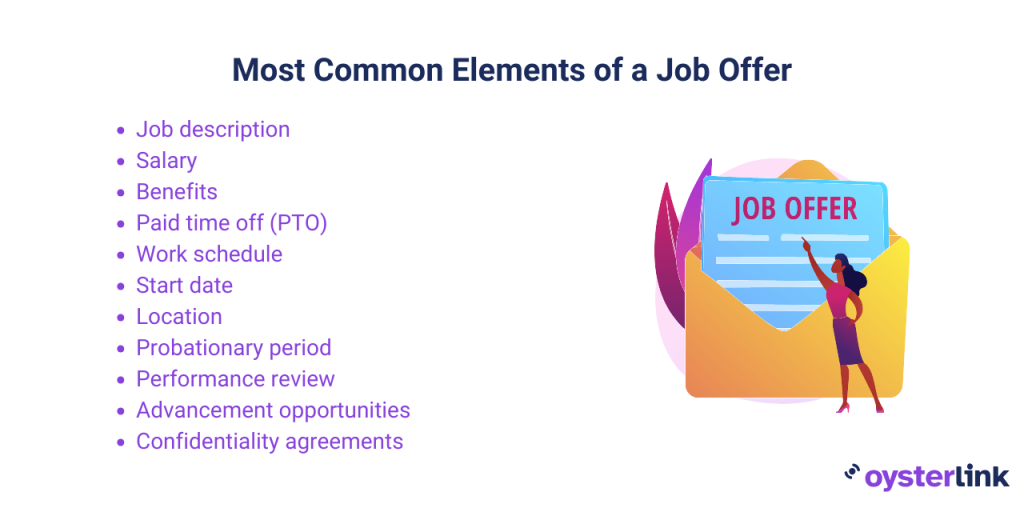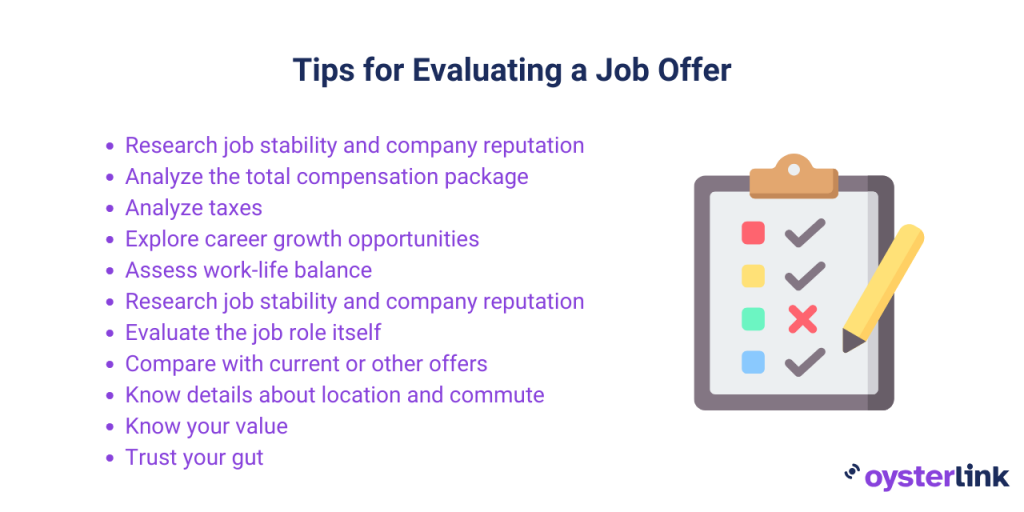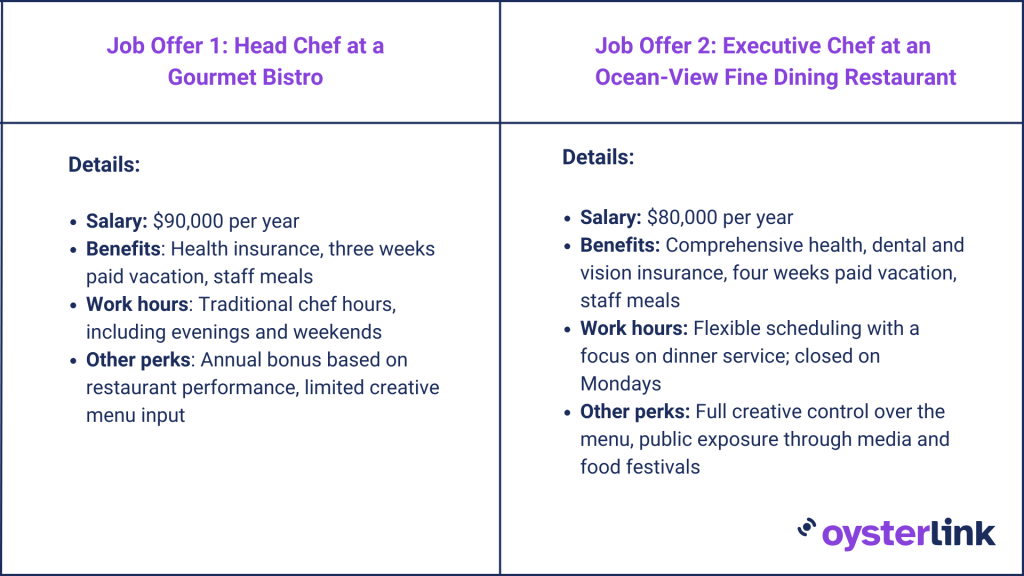In this post, we’ll explore what a typical job offer includes, how to evaluate a job offer and give you a couple of evaluation examples. To conclude, we’ll also list useful tips on how to make a final decision during evaluation.
What Does a Job Offer Include?
A job offer includes several key components that outline the terms of employment. These components can vary depending on the company and the position, but they are generally the same.
The most common parts of a job offer include:
- Job description: This part of the offer provides a detailed description of the role, including the duties and responsibilities that the position entails.
- Salary: The offer should clearly state the salary for the position, which could be expressed as an annual figure, hourly rate or another format depending on the nature of the job.
- Benefits: This includes details about additional compensation beyond the salary. Common benefits are health insurance, dental and vision plans, life insurance, disability insurance and retirement plan.
- Paid time off (PTO): The offer should specify the amount of vacation time, sick leaves, personal days, and holidays the employee is entitled to.
- Work schedule: The offer should consist of information about the expected work hours, any flexibility in scheduling and remote work options (if applicable).
- Start date: The offer should indicate when your first day will be.
- Location: The offer should state details about where the job will be performed, especially important if the role involves multiple locations or the possibility of relocation.
- Probationary period: If applicable, the offer might include information about an initial probationary or trial period.
- Performance review and advancement opportunities: The offer should include details on how and when performance will be evaluated, and potential for promotions or raises.
- Confidentiality agreements: Some offers include terms related to confidentiality such as an NDA agreement.
- Non-compete agreements: In some cases, companies in competitive industries will include restrictions on working with competing firms after leaving the company.

10 Tips for Evaluating a Job Offer
Navigating the details of a job offer can be challenging, but with the right approach, you can make an informed decision that aligns with your career goals and personal values.
Here are some useful tips you can follow when evaluating a job offer:
1. Research Job Stability and Company Reputation
Job insecurity can seriously impact your physical and mental health. That’s why when evaluating a job offer, it’s vital to consider job stability and company reputation, as they can have an effect on your career’s long-term prospects.
Job stability is tied to the company’s financial health and market position; a history of consistent growth and low turnover indicates a secure environment.
For example, as a Sous Chef, you might explore the stability and reputation of potential employers. To do this, you might start researching the history and financial health of the organization. Find out how long they’ve been in business, read reviews from both customers and employees, and check for any news about their financial performance or major changes in management.
2. Analyze the Total Compensation Package
When you’re evaluating a job offer, analyze the total compensation package, not just the salary. This comprehensive package includes various elements that contribute to your overall earnings and benefits.
The total compensation package includes:
- Bonuses and Incentives: Inquire about performance-based bonuses, signing bonuses, or profit-sharing opportunities.
- Stock Options or Equity: Some companies offer stock options or equity as part of the compensation, which can be valuable in the long term.
- Retirement Plans: Evaluate the availability of retirement plans, such as 401(k) matching, and how they align with your financial goals.
Suppose you’re a Hotel General Manager considering an offer. Don’t just look at the base salary; factor in the value of a live-in accommodation at the hotel, the potential for a substantial annual performance bonus, comprehensive health benefits and discounts at affiliated hotels worldwide.
3. Analyze Taxes
If you’re considering job offers in different locations, be aware that state and local tax rates can vary significantly. A higher salary in one state might result in less take-home pay than a lower salary in a state with lower taxes.
For example, you might be evaluating two job offers as a Restaurant Manager such as:
- Offer A: $70,000 per year in a state with no income tax.
- Offer B: $75,000 per year in a state with a high income tax rate.
At a first glance, Offer B seems more lucrative. However, after calculating the state income tax, you might find that your take-home pay from Offer A is higher. Additionally, if Offer A includes tax-advantaged benefits like contributions to a 401(k) or a health savings account, the overall financial benefit could be more significant.
If you’re interested in the estimate of the amount of money you’ll receive after accounting taxes as an hourly and salaried employee in the United States, you can use our paycheck calculator.
4. Explore Career Growth Opportunities
Evaluate whether the company offers support for professional growth, such as:
- Mentorship Opportunities: Availability of mentorship programs to guide your career progression within the organization.
- Training Programs: Access to workshops, courses, or certifications to enhance your skills.
- Tuition Reimbursement: Financial assistance for pursuing further education relevant to your role.
For example, as a Front Desk Agent, if you’re evaluating an offer from a well-known hotel chain, investigate their reputation for staff training and promotion. A company that offers clear pathways to managerial roles can be a crucial factor in your career progression.
5. Assess Work-Life Balance
Workers with a good work-life balance show higher productivity levels by 21%. When assessing a job offer, consider the flexibility of working hours, remote work options, and the company’s policy on paid time off.
For example, if you’re a Restaurant Manager, think about a job opportunity at a family-owned restaurant that closes on Sundays and holidays. This could offer you a more balanced lifestyle compared to a previous role in a bustling, 24/7 diner.
Additionally, inquire about the company’s policies on remote work, flexible scheduling and paid time off. Understanding expectations regarding after-hours communication and workload can also help determine if the role aligns with your lifestyle preferences.
6. Evaluate the Job Role Itself
It’s essential to ensure that the day-to-day responsibilities of the job align with your interests and career objectives. A role that fits well with your skills and aspirations can lead to greater job satisfaction and success in your career.
For example, if you’re a Housekeeping Manager passionate about environmental issues, a job at an eco-friendly resort where you can lead green initiatives could be an ideal match for your professional goals and personal values.
7. Compare With Your Current Role or Other Offers
If you’re applying for more jobs, chances are you’ll have three times more job offers. In that situation, it’s important to compare each option’s benefits and drawbacks. Consider factors that we mentioned above — like salary, benefits, career growth opportunities and work-life balance — to determine which offer aligns best with your goals.
If you already have a job, it’s important to analyze carefully how it compares with the new offer. Start by evaluating your level of satisfaction in your current role. Consider aspects like your daily responsibilities, work environment, company culture and relationships with colleagues and management.
For example, if you’re a spa manager you might be weighing in an offer from a luxury resort against your current role, considering factors like clientele, work environment and professional development opportunities.
8. Know the Details About Location and Commute
The location of the job and your commute can have a significant impact on your daily life. Consider the time, cost and stress associated with commuting and how it might affect your work-life balance.
For example, as a Sous Chef, an offer from a downtown fine dining restaurant might be tempting. But if it means a longer, stressful commute, consider how that will impact your overall work satisfaction. Conversely, a slightly less prestigious kitchen closer to home might be the better option.
9. Know Your Value
When evaluating a job offer, it’s important that you fully understand and appreciate your own value as well as know your strengths and weaknesses. This encompasses not just the monetary aspect of your worth in the job market, but also the unique skills, expertise and experiences that you’ll bring to a potential employer.
Imagine you’re a chef with a flair for fusion cuisine, and you’ve just been offered a role at a high-end restaurant. Your unique culinary style is in demand, so consider this as a leverage point in negotiating for a higher salary or a more prominent role in the restaurant’s culinary team.
10. Trust Your Gut
If something feels off during the interview process or while considering the offer, it’s worth considering those feelings before deciding. If you’re thinking about declining a job offer, you shouldn’t feel bad the same way you should feel happy if you want to accept a job offer.
For example, if your interview was on-site, remember how you felt during the interview and what you’ve observed about the people working there. If something didn’t feel right or conversely, if you felt a strong sense of belonging, consider these feelings before making your decision.

Comparing Two Examples of Job Offers in the Hospitality Industry
Let’s consider two hypothetical job offers within the same state to show you why one might be better than the other.

Why the Job Offer 1 is appealing:
- The salary is competitive for a head chef position in a mid-sized bistro.
- The inclusion of health insurance is a significant benefit in the restaurant industry.
- The staff meals are provided, adding a daily value and convenience for the chef.
- The annual bonus tied to restaurant performance can be a strong incentive.
Why the Job Offer 2 is more appealing:
- The benefits package is more comprehensive, particularly with the addition of dental and vision insurance.
- The extra vacation time and the restaurant being closed on Mondays offer a better work-life balance, which is rare in this industry.
- The creative control over the menu is a significant draw for a chef looking to make a mark in the culinary world.
- The opportunity for public exposure and involvement in food festivals can be a career-boosting advantage.
How To Make a Final Decision During Evaluation
When it comes to making your final decision about a job offer, it’s important to approach the process thoughtfully and systematically.
To make a final decision during evaluation you should:
- Take some time to think about the offer: When evaluating job offers, especially in roles where skills and environment are critical, like for example a sous chef, it’s important not to rush your decision. Ideally, take at least a few hours or even a full day, to reflect on all the details of the offer.
- List pros and cons: Create a comprehensive list of the advantages and disadvantages of the job offer. This can help you visualize and weigh the different aspects of the job.
- Reflect on your priorities: Consider what matters most to you in a job. Is it salary, work-life balance, career growth, company culture or something else? Ensure the job aligns with these priorities.
- Consult with people you trust: Talk to mentors, peers or career advisors. They can provide valuable insights and perspectives that you might not have considered.
- Research thoroughly: If you think you haven’t done enough research, go through the company’s background, culture and stability. Use resources like company websites, company review websites and industry forums.
- Visualize yourself in the role: Imagine a typical day on the job. Do you feel excited and motivated, or are there red flags that you can’t overlook?
Make Well-Informed Job Choices With OysterLink
Analyzing and evaluating job offers is an important skill in the restaurant and hospitality industry. To help you progress in your career, OysterLink is dedicated to empowering you with the knowledge and tools not just to thrive in your career, but also to make informed decisions when evaluating potential job opportunities.
Our Spotlight section offers in-depth resources on the restaurant and hospitality industry, including:
- Current salary trends to ensure competitive compensation
- Detailed job descriptions for precise candidate fit
- Effective interview strategies
- Hospitality industry trends
How To Evaluate a Job Offer FAQs
Start by identifying your personal and professional priorities. If financial stability is your main goal, focus on salary and compensation. For long-term growth, evaluate benefits like retirement plans or education assistance. If mental health and time with loved ones matter most, weigh work-life balance heavily. Create a list to visualize what aligns best with your goals.
Research the company’s financial health and market position. Look for consistent growth in revenue, low employee turnover, and positive reviews from current and former employees. Explore news articles, company reports, and industry forums for insights into their reputation and stability.
Compare offers using factors like compensation, career growth, company culture, and commute. Create a pros and cons list for each. Visualize yourself in each role and evaluate which aligns most with your goals and lifestyle. If possible, negotiate aspects of the offers to create a clearer comparison.
Research market rates for your role to support your case. Highlight your unique skills and experiences that add value. Be polite and professional, focusing on what you can bring to the company. Frame it as a conversation, not a demand. For example, ask, “Based on industry standards and my experience, is there flexibility to increase the salary or benefits?”
Watch out for vague job descriptions, lack of growth opportunities, unclear benefits, or high employee turnover. If communication during the hiring process is poor or if expectations seem unrealistic, those might be warning signs. Trust your instincts—if something feels off, investigate further before accepting.

Written by Mitko Terziev
With over eight years of experience in the field, Mitko is a seasoned content specialist who has penned thousands of articles covering a wide array of topics. Before writing, he spent a few months working as a Bartender in one of the best bars in his hometown. In his free time, Mitko enjoys immersing himself in the worlds of gaming and nature.

Reviewed by Marcy Miniano
Marcy is an editor and writer with a background in public relations and brand marketing. Throughout her nearly decade-long career, she has honed her skills in crafting content and helping build brands across various industries — including restaurant and hospitality, travel, tech, fashion and entertainment.




